Thursday, July 11, 2024. Annette’s News Roundup.
Joe is always busy.
Today, at 4:30 PM, the President will hold a press conference at the end of the NATO summit.
https://www.youtube.com/live/jD5a5kR8ddY?si=sHoKlCKt6xH5TDb9
On Monday, the President will be with Lester Holt.
https://x.com/msnbc/status/1811115102361342439?s=61&t=I_Od53CbnPTsbLcD0baXPg
President of all the people.
https://x.com/potus/status/1811163500061843547?s=61&t=I_Od53CbnPTsbLcD0baXPg
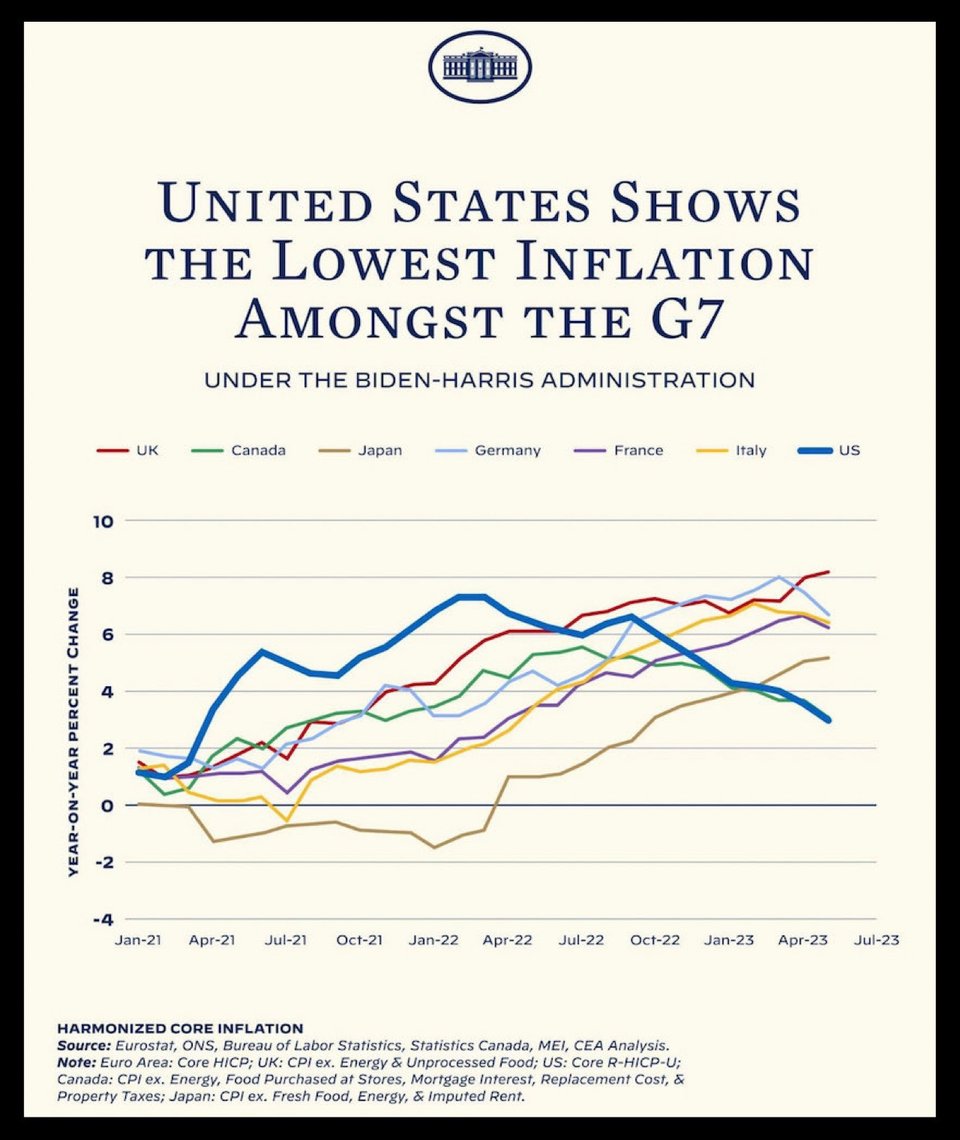
If the President can answer all Trump’s challenges this well, he will surely be re-elected.👇
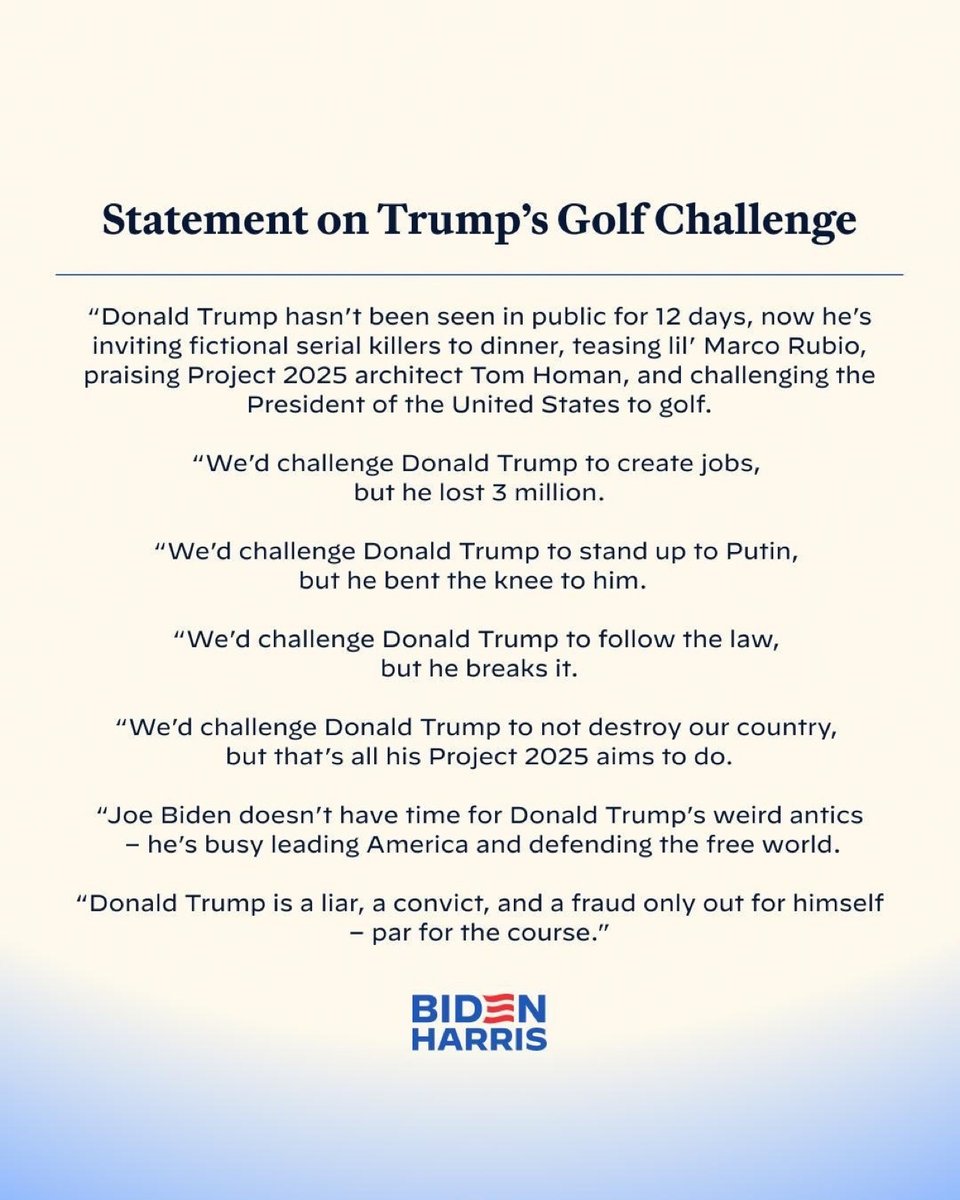
AFL-CIO Leadership Unanimously Reaffirms Commitment to Re-Electing President Biden and Vice President Harris.AFL-CIO
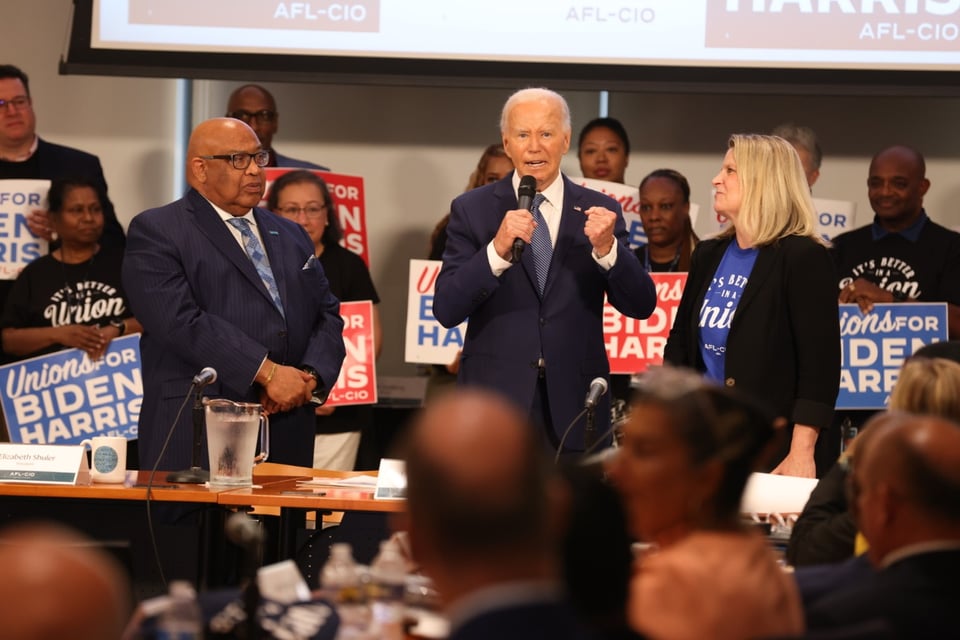
The AFL-CIO Executive Council released the following statement on President Biden’s visit to its meeting today:
The AFL-CIO Executive Council today unanimously voted to reaffirm its commitment to re-electing President Joe Biden and Vice President Kamala Harris, the leadership of the most pro-union administration in our lifetimes.
We were honored to welcome President Biden back to the House of Labor to speak to unions that represent every sector and industry of America’s workforce. No president has been more invested in helping workers than Joe Biden, who stands with working people at every opportunity, including on the picket line.
We shared stories of the hopes of working people and discussed with the president the importance of unions mobilizing for Election Day. The president’s fighting spirit was on full display, and he reiterated his deep commitment to workers and our families and to taking on corporate greed. He was that “Scranton Joe” that we all know and love.
From Day One, the Biden–Harris administration has put working people first, centering union jobs in every piece of its agenda. This administration sparked an industrial renaissance; saved workers’ pensions and hundreds of thousands of public servant jobs; expanded overtime pay; and invested in millions of good union jobs, particularly in construction. Unions have never wavered in our support of Joe Biden and Kamala Harris because they’ve never wavered in their commitment to working people, including the vigorous support of workers’ right to organize. That’s just as true today as when we endorsed the ticket more than a year ago.
The labor movement understands, as Joe Biden does, that solidarity is how we win. The message from today’s meeting couldn’t have been clearer: Right now, it’s time to come together around a vision of a country where everyone has a fair shot with a living wage, affordable health care, retirement security, and time to do the things we love like spending time with family and friends and pursuing our interests and passions. These are fundamental to, as the president reiterated to our meeting, building the economy from the bottom up and the middle out, not the top down.
The labor movement is united behind President Biden and Vice President Harris. We urge his party and the American people to join us.
Here is a video of Joe just talking to Labor Leaders at AFL-CIO Headquarters yesterday.
If you have any worries about the President’s condition, check out the President’s impromptu remarks with AFL-CIO members yesterday.👇
Worry Less. Do More.
Reminders of why Trump shouldn’t be President of the United States.
Touch to watch a ranting, incoherent man.👇 https://x.com/atrupar/status/1810842300961956147?s=61&t=I_Od53CbnPTsbLcD0baXPg
Watch. Who is “we”?
https://x.com/acyn/status/1810841967309509064?s=61&t=I_Od53CbnPTsbLcD0baXPg
In 2020, Trump decided that the Republican Party should have no platform. Now it has this one (which the Orange Man seems to have written himself).
Trump Republican Party Platform2024
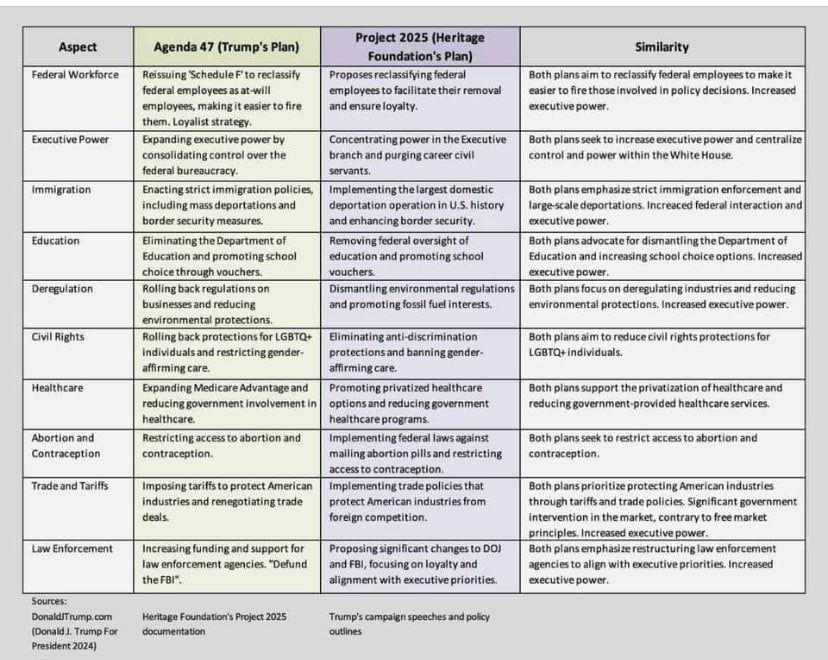
NATO leaders move to ‘Trump-proof’ the alliance in Washington - The Washington Post
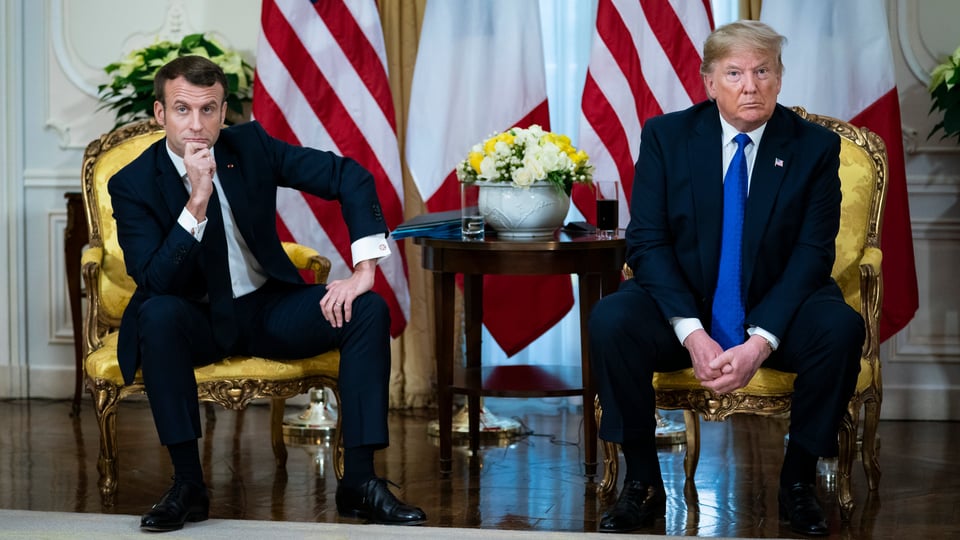
Former president Donald Trump doesn’t have a seat at the table as NATO leaders gather this week in Washington, but he might as well, as officials strategize about how to adapt the alliance for the possibility that its most senior leader may soon again be a skeptic.
Alliance policymakers have moved control of major elements of military aid to Ukraine away from U.S. command to the NATO umbrella. They appointed a new NATO secretary general who has a reputation as being especially agile with Trump’s unpredictable impulses toward the alliance. They are signing decade-long defense pledges with Ukraine to try to buffer military aid to Kyiv from the ups and downs of politics. And they are pushing up their defense spending, Trump’s single biggest anger point when it comes to NATO.
Inside Washington’s convention center, where the summit is being held, Trump isn’t often being raised explicitly, but he is casting a dark shadow. European leaders quietly wonder whether this is their final encounter with a U.S. leader who hews to a transatlantic agenda — a bipartisan constant of U.S. foreign policy from World War II until Trump’s first arrival in the White House.
“If we elect him a second time, then I think that’s, from the Europeans’ perspective, extraordinarily telling about our direction of travel in the United States,” said Andrea Kendall-Taylor, director of the transatlantic security program at the Center for a New American Security think tank and a former senior intelligence officer focused on Russia. “And so it is Trump-proofing for the most immediate four years, but there is a growing worry that the United States will be less committed to Europe over the longer term.”
Few European policymakers say they believe that Trump would formally pull the United States from NATO. Congress itself recently “Trump-proofed” U.S. membership, passing legislation that binds the country to the alliance and would require a two-thirds vote in the Senate to withdraw.
But many fear Trump would bring a far more transactional approach to the alliance, and some take seriously his vow that he would look at whether they are meeting their defense spending commitments before deciding whether to come to their aid if they are attacked. How to handle Trump is dominating social conversations among NATO policymakers in Washington, along with the related obsession of whether President Biden will drop his reelection effort.
Asked whether European leaders are talking about Trump behind closed doors, Norwegian Prime Minister Jonas Gahr Støre told The Washington Post in an interview that “you will not believe me if I said no. But it does not mean that I will tell you what we talk about.”
While in Washington, many leaders are taking the opportunity to have quiet conversations on the side with potential Trump administration foreign policy officials. Keith Kellogg, the retired general who was former vice president Mike Pence’s national security adviser and continues to advise Trump, said last month that he had received 165 requests for briefings from foreign officials since November, and that he had granted 100 of them. Kellogg noted that he doesn’t speak in an official capacity for Trump or the Trump campaign.
Many international policymakers — including Ukrainian leaders, who have the most to lose — have been hedging their bets against the possibility that Trump could return to office. That was notable on Tuesday in Ukrainian President Volodymyr Zelensky’s choice of venue to deliver a speech: the Reagan Institute, to a room of Republican luminaries and European diplomats.
Though he was careful not to comment directly about the U.S. election campaign, Zelensky urged Biden to allow Ukraine to use U.S. long-range weaponry to strike military bases on Russian territory “and not to wait for November or any other event.” “America ... is too great for small deeds. Don’t wait months. America can be great every day,” Zelensky said. Asked afterward by Fox News anchor Bret Baier how closely he was watching the U.S. election, he said, ”I think sometimes closer than you, Bret,” to laughter from the crowd.
Ukrainian leaders said that they hoped to float above the tumultuous U.S. presidential race, mindful of their role in Trump’s first impeachment in 2019, when as president he delayed defense aid to Ukraine until provided with evidence of Biden’s alleged corruption in Kyiv.
“We don’t have to fit every political process. We have to make sure that we secure our survival from political processes,” Ukrainian Deputy Prime Minister Olha Stefanishyna said in an interview.
NATO policymakers have been deep in discussions for months about how to manage Trump’s revival. After Russia invaded Ukraine in February 2022, the Biden administration resisted a direct role for NATO in the provision of military aid to Kyiv, hoping to avoid Russian perceptions that the alliance was directly in battle with Moscow.
That reluctance has faded as Ukraine’s early heroics have been tempered by recent Russian battlefield gains. Meanwhile, Trump has surged in the polls and European concerns have grown. NATO policymakers agreed in the lead-up to the summit to establish a new NATO command that will take on many of the coordination roles that the Pentagon had provided. But the U.S. military will retain its key role even under the new arrangement.
Policymakers quietly acknowledge that Trump-proofing the alliance can only go so far — not least because Trump is not the only leader who has questioned NATO policy toward Ukraine and Russia. Hungarian Prime Minister Viktor Orban visited Moscow and Beijing ahead of the summit, to the consternation of many European officials, and he has advocated a Russia-friendly policy inside the alliance and the European Union. Slovakian Prime Minister Robert Fico has also backed similar policies.
Some leaders say a Trump presidency could be fine for NATO, especially if it pushes lagging European countries to spend more on their defense.
“What I say to Europeans all the time is, ‘Stop freaking out about Trump. You’ve done this before, you did this for four years, and guess what? It actually wasn’t that bad for Europe,’” said Rachel Rizzo, a nonresident senior fellow at the Atlantic Council’s Europe Center, in a briefing with reporters. “There was some tough rhetoric and tough language that ruffled feathers certainly. But the policies that Trump put in place toward Europe were not damaging toward NATO.”
That spend-more effort has been endorsed by right-wing leaders in Europe who share many of Trump’s migration-skeptic policies and yet are also pro-Ukraine, such as Italian Prime Minister Giorgia Meloni and Polish President Andrzej Duda.
Trump and Duda “are friends. They understand their values. They understand credibility when it comes to the security obligations also,” said Jacek Siewiera, the head of Duda’s National Security Bureau.
Italy’s ambassador to the United States, Mariangela Zappia, said that NATO’s core interests can withstand elections. “I believe the NATO summit will be in fact a confirmation of how democratic systems can choose different paths but in the end stand together on principles: in this case, that borders cannot be changed through aggression,” she said.
Pro-NATO policymakers hope to manage splintering policy visions under the leadership of the incoming secretary general, Mark Rutte, who as a long-serving Dutch prime minister met repeatedly with Trump and became known for his tact in managing sometimes tense interactions.
“He made a very conscious decision to not pick a fight with the U.S. president, not to challenge him publicly or privately and never to be caught talking about him,” said Camille Grand, a former NATO assistant secretary general who is now a distinguished policy fellow with the European Council on Foreign Relations.
Oana Lungescu, who was NATO’s spokesperson between 2010 and 2023 and is now a distinguished fellow at the London-based Royal United Services Institute, said Stoltenberg’s team workshopped a single, easy to read graph that showed rises in European defense spending. The alliance also looked for ways to credit Trump for pushing allies to spend more.
“The figures were real — it’s about how you shape it and how you use it [to show] that this is achieving results, that NATO is a win,” she said.
Rutte, 57, spent 14 years wrangling political coalitions as prime minister of the Netherlands and is seen as a skilled and savvy diplomat with a frank, pragmatic style. Those who have worked with him say he is deeply committed to the transatlantic relationship and will do whatever it takes to protect it. “He deeply believes in the power and strength of U.S.-European cooperation as a force to project western values on the global stage and he will speak up for that,” said a senior European official who has worked closely with him for years, speaking on the condition of anonymity to discuss sensitive issues.
Rutte is seen as someone who can hold his ground, firmly but politely — including with Trump. In a now-famous 2018 interaction in the Oval Office, Rutte pointedly pushed back when Trump, delivering off-the-cuff remarks about trade, suggested it would be “positive” if the U.S. and Europe failed to reach a deal. “No,” Rutte said, as Trump continued to speak. “It’s not positive,” Rutte continued, smiling. “We have to work something out.”
Trump shook his hand and moved on.
Some senior officials say that the best way to improve NATO’s ability to withstand pressure from Trump is simply to spend more. There are now 23 NATO countries that meet the alliance’s baseline spending target, up from nine just a few years ago.
“Europe needs to step up regardless of the outcome of the U.S. election,” Swedish Foreign Minister Tobias Billström said in an interview. “We also have to take a greater responsibility for Ukraine, because Ukraine is in our backyard.” Sweden, NATO’s newest member, now spends roughly 2.2 percent of its GDP on defense. (Washington Post).
One more thing.
https://x.com/whitehouse/status/1811075408785264660?s=61&t=I_Od53CbnPTsbLcD0baXPg
The Enormous Risks a Second Trump Term Poses to Our Economy

Not long ago, one of us was having lunch with someone who manages a multibillion-dollar fund when the subject turned to the prospect of a second Trump term.
This person was disturbed by many of Donald Trump’s actions and concerned about what the November presidential election could mean. But when it came to one issue — the economy — he was untroubled. “We didn’t do so badly last time,” he said. “There are some things I don’t agree with, but I don’t think it will matter that much.”
We fear this is an increasingly common view. We’ve spoken to many leaders in business and finance who, when it comes to economic policy, are open to the premise that Mr. Trump is a normal presidential candidate.
We strongly disagree. The two of us have been involved in business, government and policy for many years, with more than a century of experience between us. We’ve worked with elected officials and business leaders across the ideological spectrum. And we believe a straightforward assessment of Mr. Trump’s economic policy agenda — based on his public statements and on-the-record interviews, such as the one he recently conducted with Time magazine — leads to a clear conclusion.
When it comes to economic policy, Mr. Trump is not a remotely normal candidate. A second Trump term would pose enormous risks to our economy.
At a time when our country was already on an increasingly risky debt trajectory, Mr. Trump’s tax initiatives during his presidency added an estimated $3.9 trillion to the national debt, according to Brian Riedl of the Manhattan Institute. Mainstream analyses concluded that the result — increasing demand in an already full-employment economy while having a negligible effect on business investment — added very little benefit in the shorter term and virtually nothing in the longer term.
And Mr. Trump’s second-term agenda would further harm our fiscal picture. A Committee for a Responsible Federal Budget report said that extending the 2017 tax cuts alone would add another $3.9 trillion to the federal debt and increase our debt-to-G.D.P. ratio by approximately 10 percent. This would probably lead to higher interest rates and greater inflation while undermining business confidence and could reduce our resilience in the face of future national-security or economic crises.
Mr. Trump would also reduce legal immigration at a time when our economy needs additional workers at all skill levels. Companies are already moving some operations outside the United States in order to find needed employees. Ordering the military to deport millions, as he has threatened to do, would not only lead to widespread social instability but also fail to approach the issue of undocumented workers in a way that meets our economic needs.
On trade, raising tariffs across the board — as Mr. Trump has repeatedly promised to do — would increase prices for American producers and consumers, reduce our global competitiveness and most likely lead other countries to retaliate against our exporters.
On regulation, while many business leaders have differences of opinion with President Biden, a second Trump term would pose considerable risks. Mr. Trump has made clear that his regulatory approach would not be driven by cost-benefit analysis, in which potential social and economic benefits are weighed against potential concerns. Instead, he has said he would use regulation to reward loyalists and punish perceived enemies.
In his term, Mr. Trump personally directed the Justice Department to block a merger between AT&T and Time Warner because he was reportedly unhappy with the coverage of him on CNN, which was owned by Time Warner. In a second term, he’s promised to take this approach further, for example, by pledging to reward political allies in the oil and gas industry by throttling renewable energy, one of the world’s fastest-growing industries and one in which we are in fierce competition with China.
Trump would also take unprecedented action to diminish the independence of the Federal Reserve, pressuring it to set interest rates for his short-term political gain rather than the long-term health of the economy. A top Trump economic adviser, Peter Navarro, predicts that Mr. Trump would fire the Federal Reserve chairman in the first 100 days of his second administration. Other allies have said that Fed decisions should be subject to consultation with or even approval by the administration. Such actions could do great damage to our markets and to our economy by politicizing Federal Reserve Board interest rate decisions and undermining the broader credibility of the Fed.
Mr. Trump has said he would like to withdraw from NATO obligations and has threatened to abandon our allies in Europe if they are attacked. Such threats would immediately shake confidence in America’s defense commitments and could embolden our adversaries to act in hostile ways, increasing global instability that threatens our supply chains and our markets and increasing the risk of armed conflict. Of course, if Mr. Trump were to follow through on these threats, the damage would be far worse.
The rule of law is an essential underpinning of our economy. Mr. Trump’s proposed plans would undermine the rule of law in multiple ways, including using the F.B.I. and the Justice Department to target his adversaries, probably doing the same with the I.R.S., firing United States attorneys if they refuse his order to prosecute his political enemies, using his pardon power to immunize political allies from the consequences of lawbreaking and continuing to reject the fairness and freedom of our elections.
Mr. Trump would also fill his cabinet and senior staff with people whose primary qualification is loyalty to him. In such a scenario, the White House and federal agencies would be expected to make decisions not on the policy merits but in order to satisfy Mr. Trump’s ego, anger, whims, personal business interests and political vendettas.
Nor would Mr. Trump and his allies stop there. They plan to replace up to 50,000 civil servants — nonpartisan professionals such as safety inspectors, researchers and procurement experts — with political loyalists. This may even include requiring current federal employees to take a loyalty test.
When it comes to managing crises — an essential component of any president’s economic stewardship — Mr. Trump’s term paints a troubling picture. As the pandemic spread across the United States, Trump bungled the response with indecision, erratic behavior and a focus on politics over the public well-being. Economic damage from the pandemic was inevitable. But a more effective leader could have substantially limited that harm.
Even the Trump administration’s greatest success in combating Covid, Operation Warp Speed, is now barely mentioned by him because of political pressures. There will inevitably be economic, geopolitical or other crises, and Mr. Trump’s reactions to Covid provide a deeply troubling view of how he would deal with them.
Some argue that many dire predictions raised at the start of Mr. Trump’s term did not come to pass. But he has expressed regret that his term was less radical than he would have liked — and has promised that his second term would be nothing like the first. From 2017 to 2021, Mr. Trump, while extreme in many respects, was constrained by key appointees who came from the traditional conservative establishment and by the need to appeal to the business community as he sought re-election. If he wins this November, he’s made clear that he’ll choose appointees who will be submissive to him, and he will have no looming re-election campaign providing an incentive to curb his most extreme impulses.
Nearly every element of Mr. Trump’s second-term agenda would create great risk of economic harm. In aggregate, there is a high likelihood that his agenda would lead to chaos and unpredictability, including global instability, in that way reducing investment and business activity. Meanwhile, inflation would be increased by tariffs, immigration restrictions and larger fiscal deficits.
Some may feel that we made it through one Trump term and are thus likely to make it through another. But a more apt analogy is that after we survived one round of economic Russian roulette, Donald Trump is asking us to take another spin — only this time with many more bullets in the chamber.
That would be a very dangerous game. (Robert E. Rubin and Kenneth I. Chenault, New York Times.)
Mr. Rubin is a senior counselor to Centerview Partners and was the U.S. Treasury secretary from 1995 to 1999. Mr. Chenault is the chairman and managing director of General Catalyst and a former chairman and chief executive of American Express.
https://x.com/steverattner/status/1810989803103555818?s=61&t=I_Od53CbnPTsbLcD0baXPg
Alongside the Presidential Debate conversations, somehow other legislative action is happening too.
AOC unveils articles of impeachment against Justices Thomas, Alito
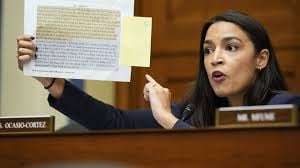
Rep. Alexandria Ocasio-Cortez (D-N.Y.) and a group of House progressives on Wednesday introduced articles of impeachment against conservative Supreme Court Justices Clarence Thomas and Samuel Alito.
Why it matters: It's a long-shot element of a broader legislative push by House Democrats to rein in the court after a spate of decisions in June that incensed liberals. Driving the news: The resolutions accuse Thomas and Alito of refusing to recuse from cases in which they had a "personal bias or prejudice concerning a party," as well as "failure to disclose" income, gifts and other financial info.
The articles targeting Thomas include a third charge: "Refusal to recuse from matters involving his spouse's financial interest in cases before the court." The resolutions point to lavish gifts both justices received from benefactors reportedly involved in or connected to cases before the Supreme Court. The measures also point to the involvement of Ginni Thomas in efforts to overturn the 2020 election and reports of "Stop the Steal" symbols at Alito's properties to argue that their recusal from Jan. 6-related cases was warranted as well. Zoom in: The articles of impeachment are co-sponsored by progressive Reps. Barbara Lee (D-Calif.), Rashida Tlaib (D-Mich.), Bonnie Watson Coleman (D-N.J.), Delia Ramirez (D-Ill.), Maxwell Frost (D-Fla.), Ilhan Omar (D-Minn.) and Jamaal Bowman (D-N.Y.).
The other side: Thomas' attorney Elliot Berke said in a statement last August that the justice has "always strived for full transparency and adherence to the law" and "never accepted a gift from anyone with business before the Court."
Thomas himself reportedly dismissed scrutiny of his financial disclosures as "negativity" in May.
Alito's representatives have similarly rebutted allegations of financial conflicts of interests, and he has denied involvement in an upside down American flag and an "Appeal to Heaven" flag that flew outside two of his houses, saying his wife was responsible.
A Supreme Court spokesperson did not immediately respond to a request for comment. (Axios).
Your Daily Reminder.
Trump is a convicted felon.
On May 30th, he was found guilty on 34 felony counts by the unanimous vote of 12 ordinary citizens.
The Convicted Felon Donald J. Trump was scheduled to be sentenced on July 11. He will now be sentenced sometime around September 18th.
Next week, the Republicans will hold their National Convention.
